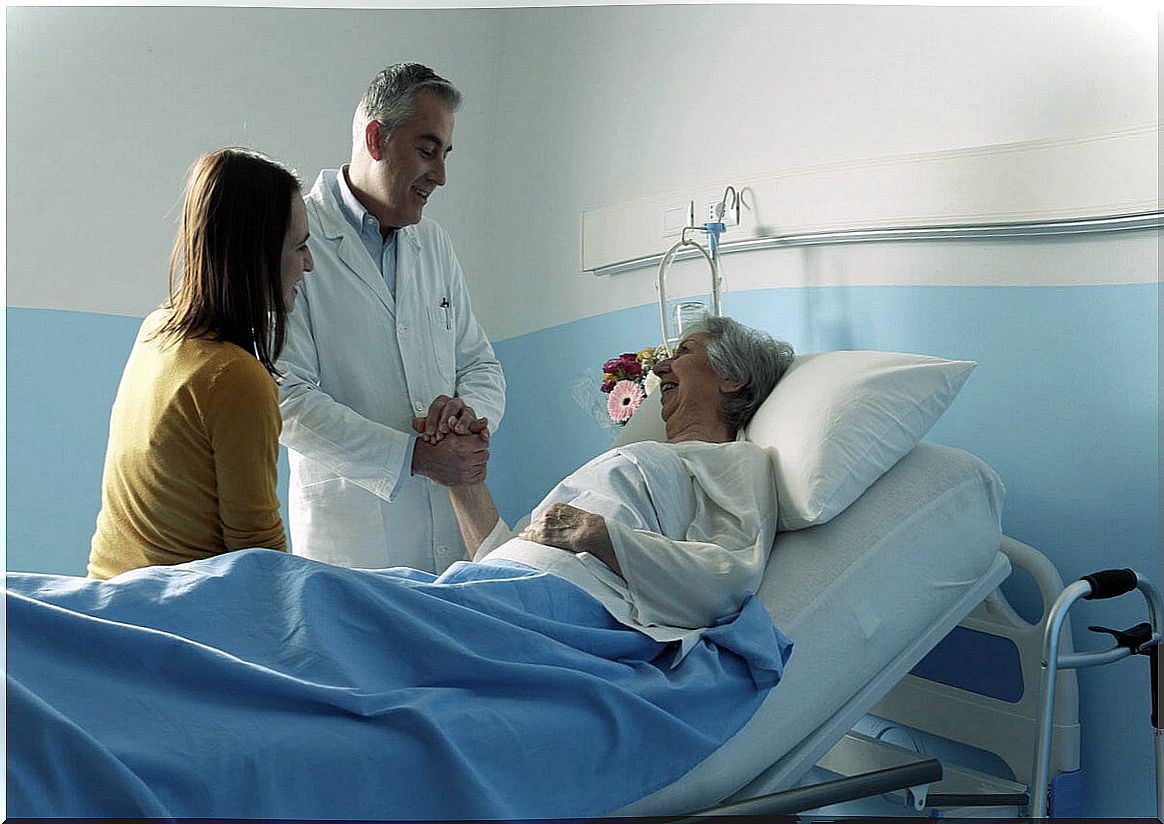Post-surgical Depression: What Does It Consist Of?

Post-surgical depression affects many more people than we think. Any surgical intervention is a source of stress, anxiety and heightened concern. Now, sometimes, no matter that the surgery itself has gone well, many patients go through a postoperative period marked by discouragement and dejection. These are situations that deserve more attention.
We ourselves or a close family member may have experienced something similar. It is true that each intervention is different, that each person goes through a more or less traumatic experience in their transit through a hospital. There are those who undergo surgery for an inguinal hernia, others for an aesthetic operation and others have to face a harsh oncological intervention.
Each experience is unique, but each and every one of us can suffer from post-surgical depression. Although it may surprise us, it should be noted that it is something quite common, however it is rarely talked about. Therefore, let us know more information about it.

Post-surgical depression: definition, symptoms and treatment
There are two groups among which post-surgical depression is common: people who have undergone cardiac intervention and those who have suffered a hip break. In the latter cases, for example, research such as that carried out at King’s College London, Institute of Psychiatry in the United Kingdom, shows that designing treatments for the prevention of depression after surgery gives good results.
However, what happens in other cases? Cancer patients, for example, often also have specialized teams to care for, among others, women who have undergone a mastectomy. However, a large number of patients remain who face their postoperative period with great difficulty.
In many cases, they feel lonely because their environment does not understand the reality they are going through. No matter that an operation has been successful, a good part does not feel well psychologically. Thus, despite the obvious advances in medicine and surgical techniques, the mental aspect remains a neglected area. Because there are many patients who experience their postoperative periods in a traumatic way.
What are the symptoms of postsurgical depression?
Research, such as those carried out at the University of Padova (Italy), shows us something interesting. It has been found that a part of the people who had heart ailments and that led to post-surgical depression, already showed depressive symptoms in the preoperative period.
Sometimes we can have patients with emotional ups and downs before the operation. The postoperative period can intensify these states, to the point of leading to major depression if help is not received. Let’s see, however, what are the most common symptoms.
- Greater exhaustion and physical pain, to the point that the recovery itself takes longer than normal.
- Irritability, hopelessness and apathy. That more muted emotional state than normal goes beyond two weeks.
- Have a greater need for sleep.
- Loss of appetite.
- Activities that were previously motivating now lose their interest.
- Difficulty regaining normal life (and just not because of obvious physical problems).
- Feeling of loneliness and misunderstanding. The person perceives that no one in their environment understands the reality they are going through.
What are the causes?
Professionals who focus on post-surgical depression show one fact. It does not matter that the intervention consisted of removing a mole or removing a tumor. Any operation is traumatic because it involves a more or less painful intrusion into the body itself. Something like that always leaves behind an emotional impact.
- To undergo an operation is to put the body (and our life) in the hands of others. Something like this creates a great sense of vulnerability. We stop being owners of ourselves to depend on third parties.
- All surgery is a physical invasion.
- Likewise, the postoperative period often implies not having autonomy, feeling pain, depending on treatments, cures, having to rest … This focus on the body sometimes makes us rethink many things.
On the other hand, in most cases, what is experienced is the feeling of having lost their invincibility. Seeing your own weakness can be scary. It is also a moment in which relationships are rethought when we see who is with us and who is not.

How can we manage the depression that arises after an operation?
The first strategy to manage post-surgical depression is knowing how to prevent it. At least, in most of these interventions with greater personal impact, they should be supported by professionals specialized in this area. Psychology should also be that usual accompaniment before and after the interventions.
- On the other hand, something that patients who live these experiences need and value is to have the validation and understanding of their closest people. A strong support network to talk to and who to count on is essential.
- Likewise, it is essential that the person be able to express feelings, emotions and thoughts. Knowing how to vent and being able to talk about their experiences is essential in all cases.
- Cognitive-behavioral therapy is an ideal approach to address these situations by allowing rationalizing thoughts and creating healthier mental, emotional and behavioral approaches.
Finally, following constant routines and having adequate medical and psychological care are the best pillars to go through those weeks or months after an intervention.
Each person lives and faces these complex experiences in a concrete way. Thus, it would be a good time to give greater visibility to postsurgical depression.









